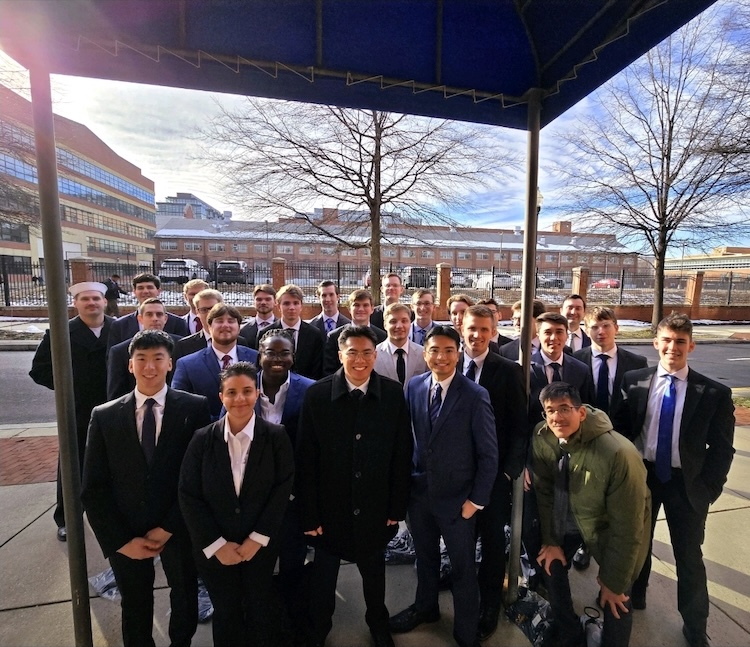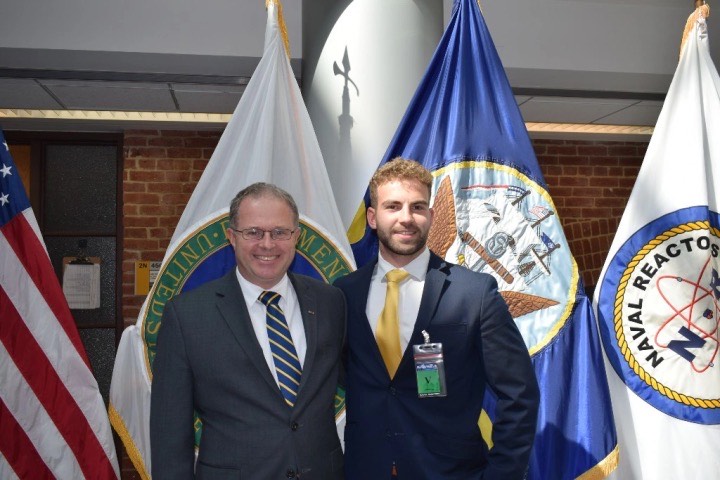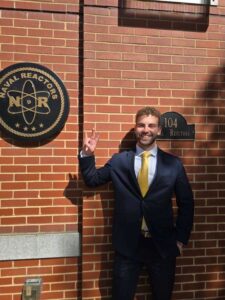Christopher Clark considered enlisting in the Navy straight out of high school until deciding to pursue his dream of studying nuclear engineering at the University of Tennessee. That’s what made an email he received last year seem predestined.
A recruiter from the Navy wondered if Clark was interested in the Naval Nuclear Propulsion Officer Candidate (NUPOC) Program. The program is for college students interested in engineering who can join the U.S. Navy as an officer in the Nuclear Propulsion Program while enrolled in a full-time college degree program.
“I see this as the best of both worlds,” said Clark, a rising senior from Louisiana. “I’ve been able to get a great education at Tennessee while getting the full college experience and will still get to serve in the military with the Navy like I always wanted to do.”
Clark is one nine current Tickle College of Engineering students, including three nuclear engineering majors, enlisted in NUPOC. Clark, Rob Monahan, and Thomas Green join a robust group of NE-affiliated past Navy nuclear qualified officers, including Emeritus Chancellor’s Professor Wes Hines, Professor Emeritus Larry Townsend, and Professor Jason Hayward.

Overall, UT ranks No. 4 in the nation among all colleges and universities for total number of active NUPOC collegiates. In the last five years, more than 20 UT graduates have joined the Navy Nuclear Officer community.
Current students in NUPOC receive a $30,000 signing bonus, a full-time paid salary, and monthly housing and food allowances for up to 42 months while in school so they can focus on their education. Following the completion of the degree program, they spend five years of active-duty service as a Naval Nuclear Officer.
NUPOC offers enlisted students job opportunities as submarine warfare officers, surface warfare officers, nuclear power school instructors, nuclear power training unit instructors, and naval reactors engineers.
“Financially, it’s a great option, especially when you are in college,” Hines said “You get good pay, and you don’t have to get your hair cut or wear a uniform. You just have to go to school and get good grades.”
Accepting the Challenge
Monahan comes from a Navy family. His father graduated from the Naval Academy and served in the Navy for 29 years. Monahan was accepted to NUPOC and sworn in to the Navy this past April in Washington, DC, with his father doing the honors.
The rigid military schedule and camaraderie fits Monahan’s lifestyle. The Northern Virginia native grew up playing football and wrestling.

“I feel like the military is just a continuation of that with the brotherhood involved,” said Monahan, a rising senior. “Plus, they’re giving you hands-on experience right out of college for five years working on reactor. That knowledge and experience is so useful for nuclear engineering, and I think that really give me leg up after my Navy career.”
Lt. Cmdr. Joshua Rogers recruited the current group of TCE students for the NUPOC program. Rogers took part in the program himself while attending college and has been in the Navy for 15 years as a Nuclear Engineering Officer (submarines).
“The biggest deal is you get paid pretty well to be a college student, and you’ve got a guaranteed job in a technical field in a leadership role after graduating. There’s just so much benefit from that,” Rogers said. “If you explore the marketplace and the private sector, there’s a lot of people graduating with engineering degrees and it’s a pretty competitive market. When you can come out after five years on active duty already having all this leadership experience that you’ve developed—you won’t get that anywhere in the private sector.”

Clark and Monahan went through a nearly four-month application process for NUPOC. They conducted a phone interview focusing on questions for calculus, physics, and other technical courses. Then, they were selected for a personal interview and testing in Washington, DC, where they both met with a four-star admiral for final approval.
“It’s a very challenging program. The Navy is very competitive to get into. Maybe the top 5% of engineers have had the qualifications to get in, and they work you really hard,” Hines said. “But anything worthwhile is going to be hard and you learn so much and develop while you are in there.”
TCE’s NUPOC Lineage
Clark has wanted to be a nuclear engineer since he was age 6 and learned about the Manhattan Project from his dad on a car ride to school.
“From that day, it has just fascinated me,” Clark said. “I thought it was crazy that the power atoms splitting allowed for such power. I knew I want to do that. I wanted to work with that stuff.”
Clark was accepted into NUPOC and sworn in this past February in Washington, DC. He wants to become a nuclear officer for submarines once he graduates from UT and begins active duty.

“I see this as a jumping off point to give me experience to go into the civilian sector or private sector,” Clark said. “I think this will be an invaluable experience to have, and not many other people will have it, which set would set me apart in the future.”
Once Clark found out about NUPOC, he informed Monahan about the program and the benefits it provides college students.
“It’s very much passed down system. A lot of people in it also tend to recruit people at their school,” Monahan said. “They even mentioned in DC how our school is a big pass down program. They mentioned that we have one of the largest NUPOC memberships.”
Hayward often discusses his NUPOC experience with students in his senior design class before they begin their group project.
“The Navy taught me about operations, systems, leadership, program management and what working together in teams as engineers can do,” Hayward said. “To the students who came to talk to me because they were interested in the program, I told them about my time in the Navy as a nuclear power school instructor, the commitment necessary for the NUPOC job, and the potential benefits of this program for their careers, whether they choose to stay in the Navy or not for a career.”
Leading the Way
Hines has always encouraged students to consider NUPOC, knowing how valuable the experience can be personally and professionally.
“The leadership skills that you get through the program are really second to none. People coming out of the program are of very high repute. The Navy nukes are some of the highest quality people that I’ve been around,” said Hines, referring to the sailors responsible for keeping nuclear-powered aircraft carriers and submarines running safely.
Monahan, who is minoring in business, plans to become a surface warfare officer once he graduates from UT. He eventually wants to work in the commercial side of nuclear energy and climb the corporate ladder.
“The connections I’ll make and the opportunities I’ll receive from NUPOC, I think will trump anything I can get going right out into the private sector,” Monahan said. “I think it’s a very useful program. I recommend anyone in the Tickle College of Engineering to look into it. The benefits are amazing.”
Contact
Rhiannon Potkey (rpotkey@utk.edu)